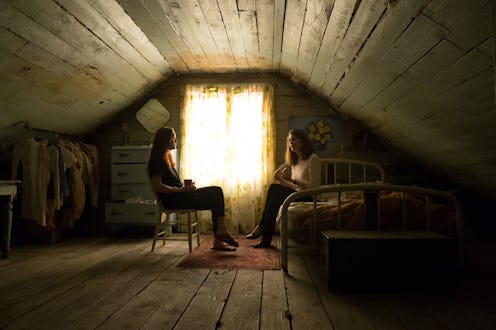Entertainment
These Are The Biggest Ways The 'Glass Castle' Movie Differs From The Book
The nearly unbelievable true story of gossip columnist Jeannette Walls' impoverished childhood, which she hid for years moving through New York high society, has been heard by millions due to her bestselling memoir The Glass Castle. Walls' balanced telling of her upbringing shows her parents as flawed romantics, but doesn't shy away from the neglect, hunger, abuse, or transience they put their children through. After six years on the bestseller list, five years in film development, and one major casting swap, the story has finally makes it to the big screen. And how The Glass Castle movie compares to the book shows just how closely the big-screen version stays to its source material.
When moving a story from a multi-chapter book to two hours of live-action, there's bound to be changes. The first of which is taking a singular, first-person perspective and translating it for large-scale live action. On-screen, Jeannette the sole author becomes "Jeannette," a character played by multiple actors, and that's before narrowing the story to fit.
The book proceeds more or less linearly, starting with Jeanette's earliest memory. The harrowing scene of a toddler lighting herself on fire cooking because her mother was busy painting makes it to screen. But the film starts off with Jeanette's successful New York life, establishing the facade she built before tearing it down. She's rubbing elbows with the rich and famous as a gossip columnist.
Her accountant fiancé David, played by New Girl's Max Greenfield, is another film fabrication. At that time in real life, Jeannette was dating (and ended up marrying) Park Avenue born-and-raised Eric Goldberg. "David" is a streamlined, movie-ready version of her real-life beau — everything her pie-eyed alcoholic father isn't, wealthy and materialistic.
In the film, on a cab ride home from a fancy client dinner Jeannette and David spot a homeless woman... who turns out to be Jeannette's mother, dumpster diving. That actually happened in the book, but unlike the movie, isn't how Jeannette's story came spilling out. That story is far more bizarre. According toVanity Fair, Jeannette said she'd gotten a call from a Village Voice cartoonist, who was going to out her and her parents' lives as squatters in his next cartoon. Jeannette, stressed and commiserating with co-worker Kelli Pryor, spilled her entire story out in one night. Pryor went on to write a romance novel similar to Jeannette's life story, right down to the "fiery redhead" main character. Just in case you doubted truth is stranger than fiction.
The movie focuses on Jeannette's relationship with her father, which means Jeanette's detailed portrayals of her mother and siblings from the book, and their entangled relationships, are mostly ellipsed. This is understandable but odd, as of her entire family, father Rex is the only one who's no longer alive. Jeannette has ongoing relationships with her siblings, and in fact lives with (and apart from) her mother in Virginia; Jeannette lives on a 205-acre farm, with Rose Mary having her own separate cottage.
It's necessary to winnow down an entire life's sprawl for it to mean anything, for book or film. But movies require an additional stripping down, and a number of reviews have pointed out these limitations may be too limiting for the story. There's fear the film will ditch the darkness and lean on the more romantic elements of Jeanette's dreamer parents, but viewers of The Glass Castle can decide if that happens for themselves.
